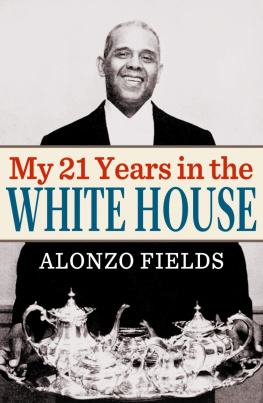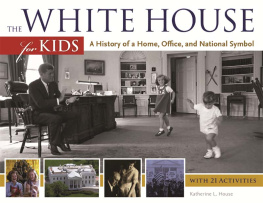
THIRTY-SIX YEARS
IN THE WHITE HOUSE
By THOMAS F. PENDEL
DOOR-KEEPER
1902
COPYRIGHT 2014 BIG BYTE BOOKS
Get more great reading from BIG BYTE BOOKS
PUBLISHERS NOTES
AS he notes below, Thomas F. Pendel was born in the Capital on May 29, 1824. He began his White House service under Lincoln in 1864 and retired in 1900. The June 1900 federal census listed him still as Usher; White House, whereas the 1880 census had listed his occupation as works in Ex. Man. [Executive Mansion] He was then widowed, having previously been married to Sarah A. Clementon, and in 1900 he was living with three grown children.
Thomas Pendel died on March 10 th , 1909 and is buried in Washington, D.C.
PREFACE
I am greatly indebted to my friend ; Mrs. Rosalie O. Goulding, for valuable assistance in the preparation of this book. Her experience as a journalist has enabled her to advise me in many matters, and acting on her advice, I have endeavored in my Recollections to relate only such events as appear to be worthy of preservation.
THOMAS F. PENDEL.
UNDER PRESIDENT LINCOLN
I was born on Analostan Island, near Aqueduct Bridge, at Georgetown, D. C., May 29, 1824. Grandfather Thomas Pendel came from Ireland prior to the Revolutionary War. My maternal grandparents were from Pennsylvania, of old Dutch stock. Grandfather Pendel was in business in Alexandria in the Hudson Bay Fur Company, and accumulated $100,000, which he spent in aiding the Revolutionary cause, in which he took an active part. His remains lie in the churchyard of Christ Church, Alexandria, where General Washington used to worship.
Father Thomas Pendel was in the Indian Wars, previous to the War of 1812, and also took part in this war. He was an artilleryman, and at the call for volunteers on Lake Erie, reported for duty on an American brig to fight an English frigate. He was in the battle of Black Rock, which site is now the city of Buffalo, and lost an arm by a passing ball from the British. For this he received a pension of ninety dollars a year.
I enlisted in the Marine Corps on March 5, 1846, at Philadelphia; and on February 5, 1847, sailed from Boston on the battleship Ohio, bound for Vera Cruz.
In 1861, or 1862, the Metropolitan Police was established by Congress at the Capital, and I made application for and received an appointment on the force. I made the, first arrest, with the assistance of Buck Essex. The case was that of a fellow named Grady, one of the English Hill toughs. A rounds-man said to us, Boys, you take a walk down Seventh Street, and if you see anything going on, take a hand in it. Just as we got opposite the Patent Office, this Grady had assaulted, or rather was assaulting, a young fellow with a whip. I went up and grabbed him and put him under arrest, then took him to Squire Dunns court and preferred charges against him. The Squire was busy writing for some time. When he got through he handed me the paper he was writing, and I was so green at the business I did not know what it was, so said: What is this, Squire? He replied, Why, that is the paper of commitment for this fellow. Take him to jail.
On November 3, 1864, Sergeant John Cronin, Alfonso Dunn, Andrew Smith, and myself were ordered to report at the First Precinct, in the old City Hall, at one oclock in the afternoon. We supposed we were to be detailed for detective work in New York City on account of the great riot then on there, especially as we were ordered to report in citizens clothes, to conceal our revolvers, and to be sure to have them all clean and in good order. We arrived at the City Hall, and then were told where we were to go, which was to the Presidents Mansion, there to report to Marshal Lanham [ sic ], at that time United States Marshal of the District of Columbia, and a bosom friend of Abraham Lincoln.
[ It seems odd that Pendel should misspell the name of Ward Lamon, Lincolns close personal friend and self-appointed bodyguard. Lamon was famously absent the night Lincoln was assassinated at Fords Theatre on April 14, 1865, having been sent by Lincoln to Richmond, Virginia .]
These were days that tried mens hearts, and womens, too. Men were falling at the front by hundreds, both in the Union and in the Confederate armies. There was weeping and mourning all over the land. Our nation was trembling with anxiety; we were all hoping that the great strife was over or soon to , be.
Marshal Lanham took us upstairs and into the Presidents office, where we were introduced to him and to his two secretaries, Mr. [John] Nicolay and Mr. [John] Hay, the latter now being Secretary of State [under William McKinley and Theodore Roosevelt. The death of McKinley was communicated to Vice President Teddy Roosevelt by Hay]. We were then instructed to keep a sharp lookout in the different parts of the house, more particularly in the East Room and at the door of the Presidents office. After we had been on duty about three days, Sergeant John Cronin came to me and said, Pendleton, I want you to take my place near the Presidents office, and I will send your dinner to you. I took his place, and he sent my dinner up to me, but I think that was the last duty on the force he ever performed. He had other business in the city.
[ Pendel does not explain why throughout the text of this volume, Lincoln calls him Pendleton. In a New York Times interview, however, he stated that both Abraham and Mary Lincoln called him that. ]
On the first Sabbath morning, as nearly as I can remember, a few days after our going on duty and the occurrences with Cronin which resulted in his leaving, it being the first Sabbath we were on duty at the White House, we were in a little waiting room on the right-hand side of the stairs. This room is now sometimes used by the President as a smoking room, and also as a reception room for those calling on the President and his family socially. Where the elevator now is used to be a pair of little old-fashioned stairs. You would go up a few steps and come to a landing; up a few more steps and another landing, and so on. This was a favorite stairway of Mr. Lincolns, for he used it more than any other in the house. When he came downstairs that Sunday morning we were all chatting, and by we I mean Edward Burke, his old coachman, Edward McManus, Alfonso Dunn, and myself. When Mr. Lincoln came into the room he said, Which one of you gentlemen will take a walk with me as far as Secretary Stantons house? He is sick in bed and I want to see him. As I had seen a good deal of the world and had been placed with public men of high station, I immediately arose and said, Mr. President, I will walk with you. After we had passed out of the front door and were still on the main portico, but out of the hearing of any one, the President said to me, I have received a great many threatening letters, but I have no fear of them. I said, Mr. President, because a man does not fear a thing is no reason why it should not occur. He replied, That is a fact.
After we got off the portico, going east, I said, Mr. President, there has been many a good, brave man who has lost his life simply because he did not fear. Then he remarked in a thoughtful way, That is so; that is so.
Then we passed along out the eastern gate and across Pennsylvania Avenue to Secretary Stantons house, which was opposite Franklin Square on the north side of K Street, near the late Senator Shermans residence. It was an elegant building. I stepped up and rang the bell, and the servant who came to the door admitted us at once. We were shown into the private parlor, and the President said to me, Now you remain down here; I am going upstairs into Secretary Stantons room; he is sick in bed. I said, All right, Mr. President. I picked up a book and passed the time examining it until the President returned. On the way back to the White House the President was silent a long time, thinking of the grave problems of the day, I presume.
Next page








